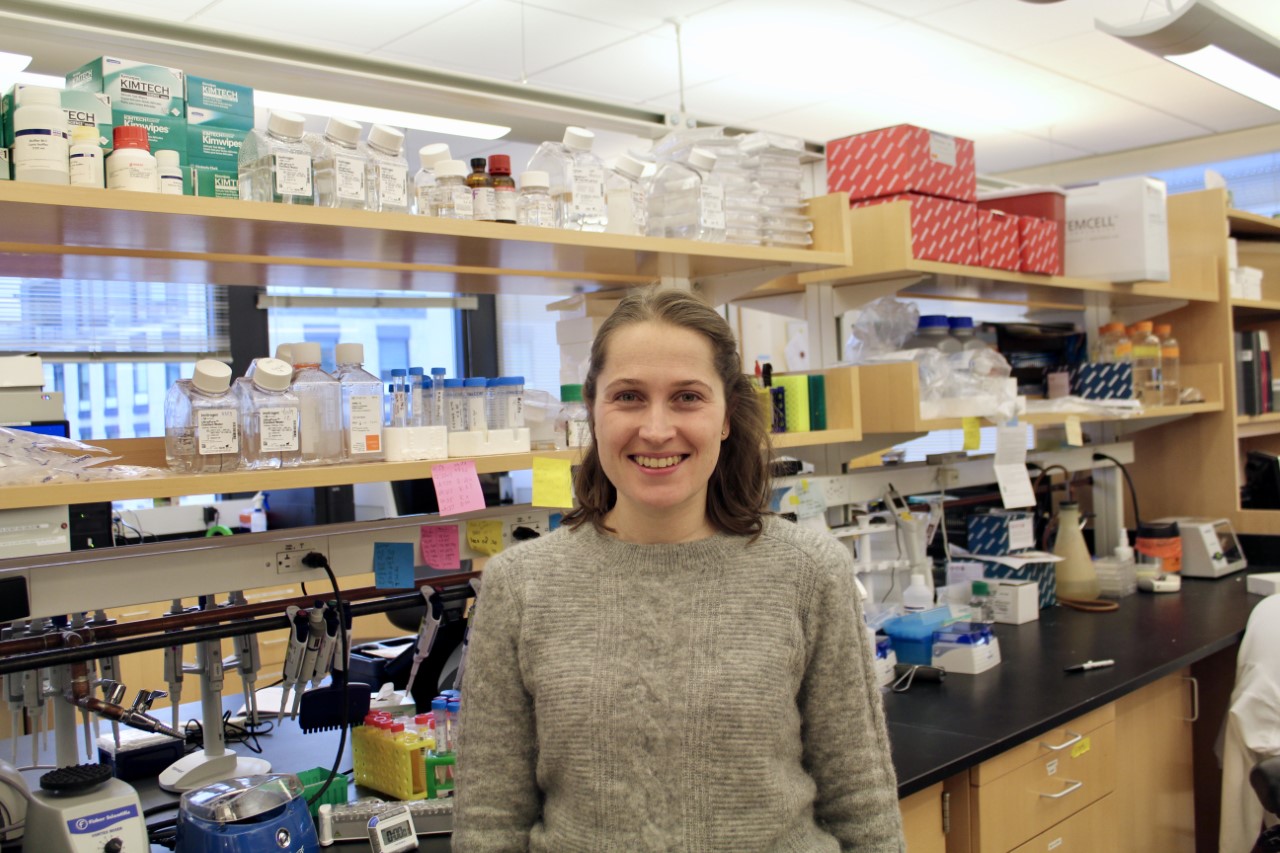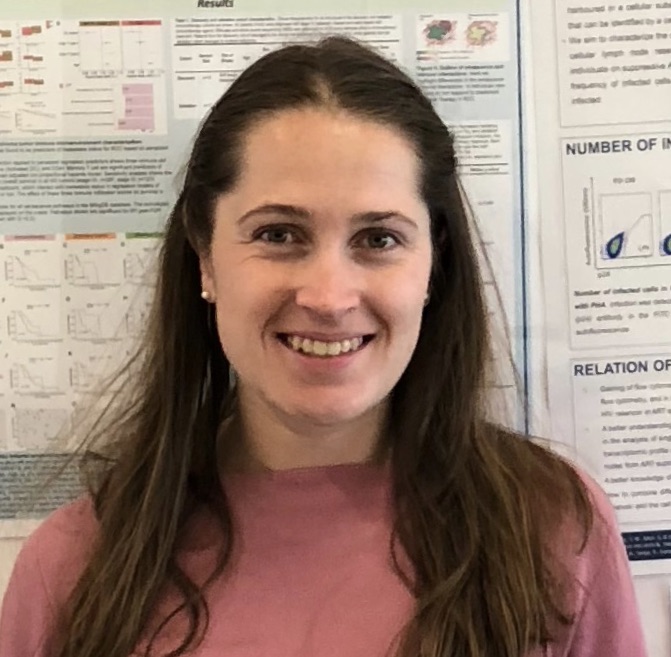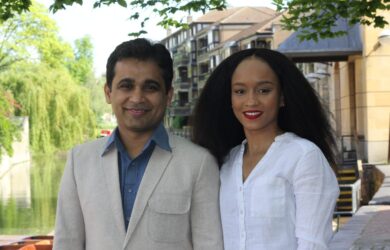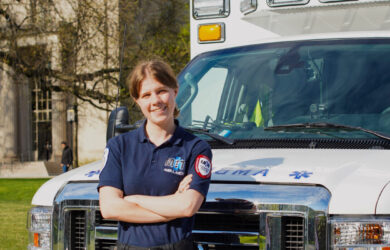
Isabella Ferreira's PhD will seek to understand the cell mechanisms that allow HIV to survive in patients who take antiretroviral medication.
I cannot sit idly by and watch the toll HIV is taking on my country. I have an obligation to do all I can to alleviate the suffering.
Isabella Ferreira
When she was 16, Isabella Ferreira did some work experience on the paediatric ward of a local hospital in KwaZulu-Natal.
The experience of seeing young children with HIV had a huge impact on her and she wrote about one girl in particular in a school essay soon afterwards:
“Amongst the tangle of the once white, hospital sheets lay the form of a little girl. Her drawn face rested uneasily on the pillow, surrounded by a few scraggily braids. She had her eyes clamped firmly shut, her brow furrowed in pain. Every so often she would lick her painfully cracked lips. Around her neck, wrists and waist she wore several colourful pieces of string – an indication that her parents had trusted in other forms of medication to save their child. But it was her actual body that concerned me the most. Her skin, like that of an animal hide drawn tightly over the hollowed out wooden frame of a djembe drum, covered her skeletal frame. Her tiny hands clasped tightly together over her large, protruding belly which heaved with every breath she took. This was the effect of AIDS. I glanced at the clipboard attached to the end of her cot. Seven years of age it stated, but what I saw before me was the body of a three year old.”
Isabella [2019] says the experience brought home to her the reality of HIV/AIDS. She says at the end of her essay: “The experience of seeing one little girl with the effects of this deadly disease gave me a clear sense of the predicament we as a province, a nation, and even a continent are in.”
It was to prove a turning point in her life. Isabella will begin a PhD in Medicine this September which will seek to understand the cell mechanisms that allow HIV to survive in patients who take antiretroviral medication and aid progress towards developing a functional cure for HIV.
She will look at the two main cell types that make up what is known as the HIV reservoir – the places in the bodies of patients taking antiretrovirals where HIV lies dormant – and will seek to understand their cell biology and what allows them to become infected. The ultimate aim is to develop targeted therapeutics which can reverse their latent state and kill them.
Early life
Isabella was born just outside Durban in KwaZulu-Natal. An only child, her father was an attorney and her mother a physiotherapist who worked mainly with disadvantaged children with disabilities. Isabella attended a Waldorf school and then won a music scholarship to go to an all girls boarding school. She started learning the violin when she was eight and the piano when she was nine and music was a huge part of her life growing up. She played piano in a jazz band and violin in the local and provincial orchestras, going into local schools to do outreach work with the KwaZulu-Natal Youth Orchestra.
Isabella’s parents often took her to their workplaces when she was young and through seeing her mother working with children with mental and physical disabilities, some of whom needed medical treatment, she developed an early interest in health and medicine.
Although music took up a lot of her time at school, Isabella decided that science was where her future lay. “Music was my passion, but I didn’t feel as challenged by it mentally and I felt I could have more impact in science than in medicine because I could reach more people,” she says. However, she did later consider doing a course in music therapy.
Genetics
Isabella did a double degree in genetics and psychology at the University of Cape Town. She was fascinated by psychology because of her interest in how people think about health and other issues. In particular she was influenced by how the South African government had previously denied the extent of the HIV epidemic in the country and wanted to understand how scientific evidence could break through the politics and have an impact.
The course was four years in total, but Isabella took a year off in 2015 to repeat one genetics course and became involved in literacy work. At school she had gone into preschools in disadvantaged areas to teach English and she felt that she had drifted away from the kind of community engagement she felt passionately about. She taught English literacy on a one-to-one basis to immigrant and non-English speaking communities.
“I needed to ground myself. During my undergraduate course I had become out of touch with what I wanted to do which was to work with people and have an impact at the local community level,” she says.
After considering a music therapy course, Isabella chose to continue with genetics for her honours degree, but moved to the University of KwaZulu-Natal which she felt was more community-based.
The programme was very small and competitive and was based on the university’s agricultural campus. Isabella did two conservation-related projects – one on honey bee viruses and the other on vultures and ecosystemic health – which taught her the technical skills she needed to continue her studies. All the students had to tutor undergraduate students as part of their course and help them to make the transition from school to university.
The HIV reservoir
It became increasingly clear to Isabella that she wanted to focus on molecular biology. In 2017, she joined the multidisciplinary Wellcome Trust-funded Africa Health Research Institute for her master’s. The Institute, which is an academic partner of University College London, has collaborations with several other research bodies, including MIT and Harvard.
Isabella’s project focuses on the HIV reservoir, the sanctuary sites in the body such as the lymph nodes where HIV lies dormant and where it can rebound if resistance to the antiretroviral medication develops.
Isabella’s laboratory works with a hospital in Durban to obtain samples from study participants. The Shalek laboratory at MIT has developed a platform which can do single-cell RNA sequencing on the subset of cells from the lymph nodes which are thought to form the HIV reservoir. This will allow researchers to see whether they are infected with HIV and how this may be preventing HIV from being cured.
For her master’s Isabella received a fellowship which is funded by the Sub-Saharan African Network for TB/HIV Research Excellence. She says the organisation has been very supportive of her research, as has her supervisor, Dr Alex Sigal at AHRI, who backed her request to become a visiting student in Boston so she could help push the project forwards. The experience has taught her many of the technical skills around the study of cell biology which she needs in order to delve deeper into cellular reservoirs.
Tackling resistance
At Cambridge there will be a lot of continuity with the work she is doing now. She will be supervised by Dr Ravi Gupta. Dr Gupta already works with Isabella’s laboratory in South Africa where he is on the faculty and has close links to the MRC Cambridge Stem Cell Institute. “My PhD will provide the proteomics and cell biology expertise I need to take the next step in my research. It will be a beautiful continuation from what I am doing now and I will continue to collaborate with my master’s supervisor and be part of a wonderful network,” says Isabella, who will be based at Corpus Christi College.
She is looking forward to starting her PhD and says that it has been her dream to study at Cambridge since she was 13 when she came on a music tour with her school. “I am very honoured to be offered something so prestigious as the Gates Cambridge scholarship. It is something I would never have imagined in my wildest dreams,” she says.
She adds that it is very important to her that her research continues to be focused on Africa and on finding a cure for HIV. She says that, while antiretrovirals have been a positive step, they are expensive, carry stigma and side effects and are unsustainable in the context of developing countries, and resistance is growing. “I cannot sit idly by and watch the toll HIV is taking on my country,” she says. “I have an obligation to do all I can to alleviate the suffering.”

Isabella Ferreira
- Alumni
- South Africa
- 2019 PhD Medicine
- Corpus Christi College
I grew up in KwaZulu-Natal, South Africa, the epicenter of the HIV epidemic. This greatly influenced my research interests. I pursued an undergraduate at the University of Cape Town, majoring in genetics and psychology, which gave me the ground tools to understand both the basic science research and the human side of HIV infection. During my Master’s degree at the Africa Health Research Institute in Durban, I have been identifying the cellular HIV reservoir in lymph nodes from antiretroviral suppressed individuals. Whilst pursuing a PhD in Medicine at Cambridge, I will seek to understand how different cell types that make up the cellular HIV reservoir interact and become permissive to HIV infection. By understanding these interactions, I will be able to identify key pathways that can be manipulated therapeutically to reduce or eradicate the HIV reservoir, allowing for a functional cure. Achieving a functional cure is of immense importance as we currently do not have a cure and it is unsustainable for individuals living with HIV to take daily medication for the rest of their lives, especially in the developing world, where access to medication may be limited. I am honoured to be a part of the Gates Cambridge community and look forward to working and collaborating with like-minded scholars who are committed to improving the lives of others.
Previous Education
University of Kwazulu-Natal Virology 2019
University of Kwazulu-Natal Genetics 2017
University of Cape Town Genetics & Psychology 2015












